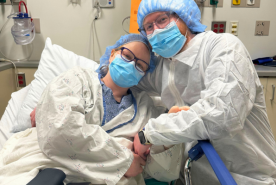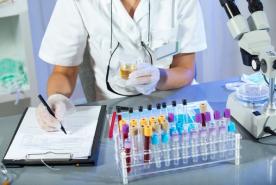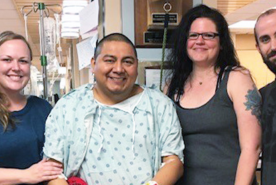What is Blood typing (ABO compatibility)?
Blood typing is the first blood test that will determine if your blood is a compatible match with the potential donor's blood. This test measures blood antibodies that react with different blood groups.
If the donor's blood type works with your blood type, the donor will take the next blood test (tissue typing). The Rh factor (+ or -) of blood does not matter. The following blood types are compatible:
- Donors with blood type A… can donate to recipients with blood types A and AB
- Donors with blood type B… can donate to recipients with blood types B and AB
- Donors with blood type AB… can donate to recipients with blood type AB only
- Donors with blood type O… can donate to recipients with blood types A, B, AB and O (O is the universal donor: donors with O blood are compatible with any other blood type)
So,
- Recipients with blood type O… can receive a kidney from blood type O only
- Recipients with blood type A… can receive a kidney from blood types A and O
- Recipients with blood type B… can receive a kidney from blood types B and O
- Recipients with blood type AB… can receive a kidney from blood types A, B, AB and O (AB is the universal recipient: recipients with AB blood are compatible with any other blood type)
If blood types are not compatible, the donor still may be able to donate directly to you using treatments that lower your blood antibody levels. In addition, the donor may consider donating through a paired exchange program which would allow you to get a kidney from another donor who is not a match for their intended recipient. Talk with your transplant coordinator for more information and additional support.
Check out our online communities to connect, learn more and hear from others going through similar experiences.
What is Tissue Typing?
The first blood test is to determine the tissue (HLA) type of the patient and the potential donor to see how well they match. Each person's tissues, except for identical twins, are usually different from everyone else's. It is believed that the better the HLA match, the more successful the transplant will be over a longer period of time. Because of the way chromosomes/DNA are inherited or passed down in a family, a parent and child would have at least a 50 percent chance of matching, siblings could have a zero to 100 percent match, and unrelated donors would be less likely to match at all. The best match for the recipient is to have a full match. (This is known as a zero mismatch.) It is possible for all markers to match, even with an unrelated deceased donor organ, if the patient has a very common HLA type.
The second blood test measures antibodies to HLA; this test is done for the patient only and is repeated frequently (sometimes monthly but less often dependent upon the transplant program policy). HLA antibodies can be harmful to the transplanted organ, and they can increase or decrease over time so they must be measured while waiting for a transplant, immediately before a transplant surgery, and following transplantation. If a patient has HLA antibodies in their blood, they are considered HLA “sensitized” and it is best to find a donor with HLA types that avoid the HLA antibodies in the patient’s blood. Importantly, HLA antibody levels can change following events such as blood transfusions, miscarriages, minor surgeries (including dental work or fistula replacement) or severe infections, so you should communicate these events to your transplant team.
Transplant
Looking for more info about kidney transplants?
Join our kidney transplant community for useful tips on finding a living donor, helpful online communities, and much more.
What is Percent Reactive Antibody (PRA)?
This is another term you will hear often while being evaluated for a transplant. When you are exposed to foreign tissues, either through a blood transfusion, pregnancy or previous transplant, you may develop an antibody to different HLA proteins. If you test positive for HLA antibodies, you are considered “sensitized” and your PRA percentage will be greater than 0. The more HLA antibodies that you have in your blood, the higher the PRA percentage. It is important to test for the presence of these HLA antibodies before your transplant. If you have a high level of HLA antibodies, it may be more difficult to find a compatible kidney for you. However, new procedures and treatments are being developed to reduce the antibodies in your blood. As mentioned above, HLA antibodies can vary over time and so your %PRA can also change.
What is a Serum Crossmatch?
A serum crossmatch is a blood test you and the donor will have multiple times, including right before the transplant surgery. To do the test, cells from the donor are mixed with your serum. If your serum has antibodies against the donor's cells, the antibodies will bind the donor cells and be detected using a fluorescent detection method. If these antibodies are at high levels, the donor cells will be destroyed. This is called a positive crossmatch and it means that the transplant cannot take place. To do so would result in immediate rejection of the transplanted kidney.
If you would like more information, please contact us.


















